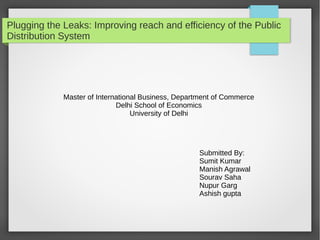
MIBians
- 1. Plugging the Leaks: Improving reach and efficiency of the Public Distribution System Master of International Business, Department of Commerce Delhi School of Economics University of Delhi Submitted By: Sumit Kumar Manish Agrawal Sourav Saha Nupur Garg Ashish gupta
- 2. What is PDS? Public Distribution System (PDS) is an Indian food security system. Established by the Government of India under Ministry of Consumer Affairs, Food, and Public Distribution and managed jointly with state governments in India. it distributes subsidized food and non-food items to India's poor. Major commodities distributed include: Wheat Rice KeroseneSugar Kerosene
- 3. Role of Government in running PDS? ● Both the central and state governments shared the responsibility of regulating the PDS. ● Central government is responsible for procurement, storage, transportation, and bulk allocation of food grains ● State governments hold the responsibility for distributing the same to the consumers through the established network of Fair Price Shops (FPSs). ● State governments are also responsible for operational responsibilities including allocation and identification of families below poverty line, issue of ration cards, supervision and monitoring the functioning of FPSs. ● Under PDS scheme, each family below the poverty line is eligible for 35 kg of rice or wheat every month, while a household above the poverty line is entitled to 15 kg of foodgrain on a monthly basis.
- 4. Fallouts of PDS ● Growing instances of the consumers receiving inferior quality food grains in ration shops. ● Deceitful dealers replace good supplies received from the F.C.I(Food Corporation of India) with inferior stock and sell FCI stock in the black market. ● Illicit fair price shop owners have been found to create large number of bogus cards to sell food grains in the open market. ● Many FPS dealers resort to malpractice, illegal diversions of commodities, hoarding and black marketing due to the minimal salary received by them. ● Numerous malpractices make safe and nutritious food inaccessible and unaffordable to many poor thus resulting in their food insecurity. ● Identification of households to be denoted status and distribution to granted PDS services has been highly irregular and diverse in various states. The recent development of Aadhar UIDAI cards has taken up the challenge of solving the problem of identification and distribution of PDs services along with Direct Cash Transfers. ● Regional allocation and coverage of FPS are unsatisfactory and the core objective of price stabilization of essential commodities has not met.
- 5. Restructuring of PDS a) Items other than rice and wheat need to be excluded from the purview of TPDS. The main objective of providing food subsidy to the poor is to ensure food security. Since rice and wheat are the basic necessities for the poor, food subsidies must be restricted to these two commodities. b) Sugar should be kept outside the purview of PDS. It should be decontrolled and the system of levy on sugar discontinued. c) It is argued that encouraging production of coarse cereals in dry land areas can check environment damage like degradation of soil to some extent. However, there is difficulty in supplying coarse cereals through PDS and bringing them under the cover of food subsidy. The average shelf life of coarse grains is limited, making them unsuitable for long-term storage and distribution under PDS. The inclusion of coarse cereals under PDS cannot be taken up as a national level programme since there is no standard variety of coarse grain. However, initiatives on the part of state governments catering to the needs of specific localities are possible. d) Kerosene oil is also supplied through PDS and is intended for the poor. However, there is large-scale diversion of this commodity and subsidised kerosene is used for adulteration with diesel. The subsidy on kerosene is thus cornered by the non-poor. A study of four states carried out by Indira Gandhi Institute for Development Research (IGIDR), Mumbai shows that there is huge leakage of kerosene meant for PDS. It is irrational, therefore, to continue to subsidise kerosene at such high rates and continue its distribution through the PDS. The subsidy on kerosene should be phased out by raising its supply price under PDS while eliminating all domestic central (e.g. Cenvat) and state (e.g. sales tax) taxes on it so as to encourage private supply through petroleum retail outlets and small dealers rather than FPS. Alternately, if kerosene is to be retained under PDS, the extent of subsidy given should be reduced so that there is less incentive for diversion. e) All further attempts to include more and more commodities under the coverage of food subsidy should be resisted. f) The FPS should be permitted to sell all commodities (other than rice and wheat) at full market prices in order to ensure their economic viability.
- 6. g) The coverage of TPDS and food subsidy should be restricted to the BPL population. For the APL population, which has the purchasing power to buy food, the Government needs to only ensure the availability of food grains at a stable price in the market. Stability in food grain prices should be ensured through the maintenance of buffer stock and open market operations of the FCI. Any attempt to revert to the old concept of a universal PDS will be a retrograde step and needs to be resisted. However, in the current situation, where the FCI has huge surplus stocks of foodgrains, it may be necessary to continue supply of cereals under PDS to the APL population at below economic cost as a temporary measure. h) With the liberalisation of external sector, the operation of the buffer stock can be supplemented by timely exports and imports and this will effectively mean that a smaller buffer stock will be required. i) Ration cards should not be used by the administration as an identification card for various purposes. That role should be assigned to multi-purpose identity cards
- 7. References: ● http://en.wikipedia.org/wiki/Public_Distribution_System ● http://planningcommission.nic.in/plans/planrel/fiveyr/10th/volume2/v2_ch3_4.pdf ● http://planningcommission.nic.in/reports/peoreport/peo/peo_tpds.pdf ● http://apcrindia.org/wp-content/uploads/2011/10/PDS_In_India-A_Brief_Overview.pdf